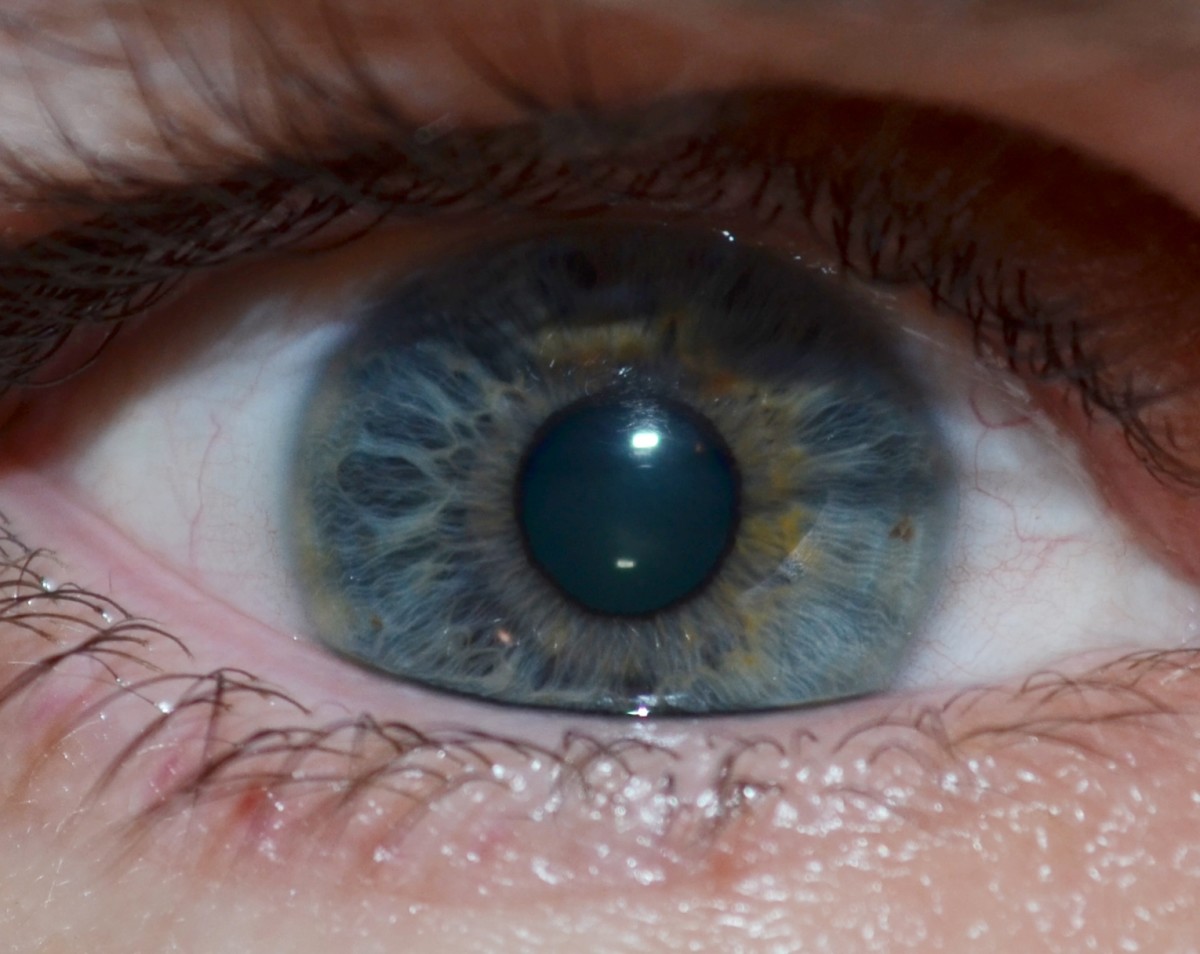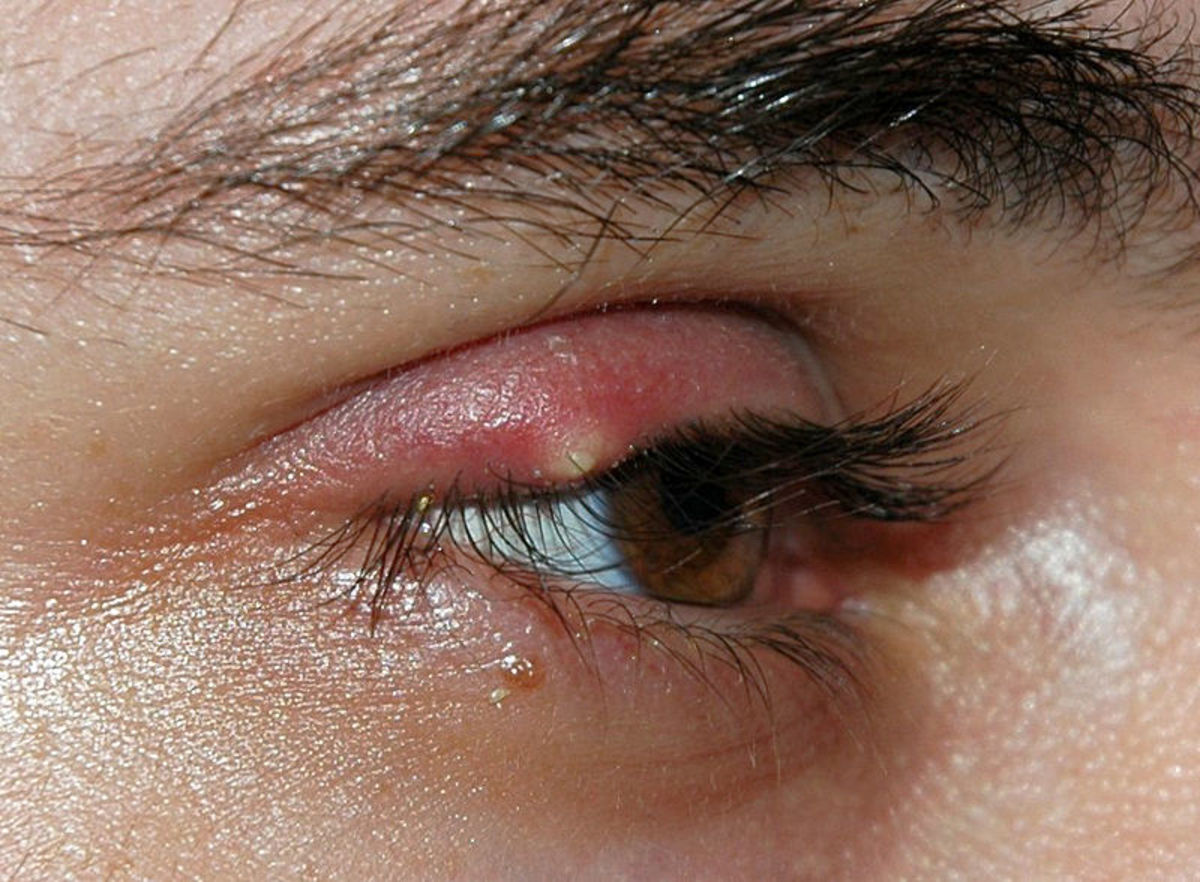Quick and Easy Way to Improve Your Eyesight: Cataract Surgery
Cataract in Human Eye
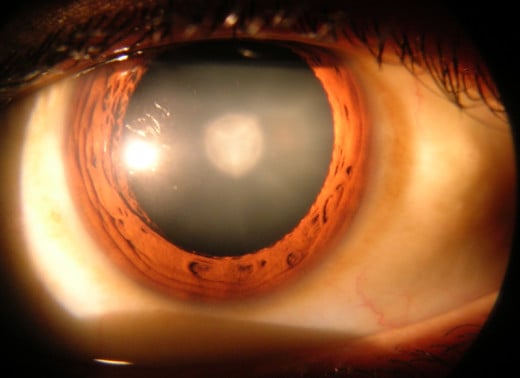
Human Eye: Cross-sectional view.
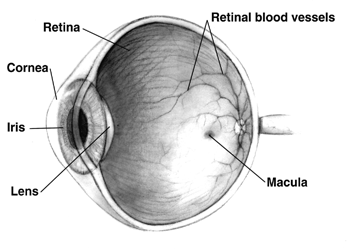
Cataract Surgery: When the Doctor Says it's Time
Cataract Surgery: When the Doctor Says it's Time
If you're like me, when your eye doctor says it's time to have cataract surgery, you're are probably cringing at the thought of someone sticking needles and knives in your eyeball. But, when the cataract n my right eye became so bad that it was like looking through a piece of wax paper, and I could no longer enjoy reading or writing, and I couldn't read street signs when I was driving, I decided to concede.
Cataracts can be caused by numerous things, other than age, that include diseases, environmental factors, and occupational factors. Diseases that can contribute to cataract development include, but are not limited to, diabetes, high blood pressure, and rubella contracted by a mother during preganancy among many other things.
There is some speculation that over exposure to UV light from the sun can also promote cataract growth, so it is always wise to wear UV blocking sunglasses when you are outside. The sun can be just as bad for your eyes as it is for your skin, according to some health professionals.
Some occupations, such as glass blowing or working around high-temperature furnaces can also promote the growth of cataracts. In addition, certain jobs in the chemical industry can also have an adverse impact on vision, not only cataracts, but also other eye diseases, if one is exposed to chemical vapors. That's why if you are working in one of these industries, it is vitally important to wear the proper eye protection for the job. I was exposed, at one point in time, to a very irritating chemical due to incorrect information being on the MSDS for that chemical. Consequently, I suffered corneal abrasions to both of my eyes, and my eye surgeon believes that could have been a contributing factor to my getting cataracts at a relatively early age.
Cortical Cataract
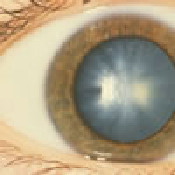
Types of Cataracts
Not All Cataracts are Created Equal
There is not merely one type of cataract that afflict people. There are multiple types of cataracts, and each type has unique symptons that will help your eye doctor determine which type you have. Also, different types of cataracts have different causes.
There are mainly three types of cataracts that are associated with aging. "They are Nuclear Sclerotic, Cortical, and Posterior Subcapsular. As a person ages, any one type, or a combination of any of these three types, can develop over time:" Source:
Nuclear Sclerotic
Nuclear Sclerotic cataracts are caused by a hardening and yellowing of the lens in the eye. If one has this type of cataract, the primary symptom is the eye not being able to properly focus.
Cortical
Cortical cataracts are caused by an opaqueness, or cloudiness in the cortex of the lens (outside edges). This is caused by water content of the lens fibers changing, and it usually results in a star like pattern from the outside edges of the lens toward the center.
"These fissures can cause the light that enters the eye to scatter, creating problems with blurred vision, glare, contrast, and depth perception. (See What Kinds of Vision Changes Are Related to Cataracts? for more information.) People with diabetes are at risk for developing cortical cataracts." Source: http://www.afb.org/section.aspx?FolderID=6&SectionID=112&DocumentID=5676
Posterior Subcapsular
Posterior subcapsular cataracts start out as a cloudy area on the back of the lens, beneath the lens "capsule," which is a membrane that encases the lens and keeps it in place.
A "halo" effect may be caused by this type of cataract, and also glare around bright lights can be caused by this. This type of cataract can be caused by using sterioids, and can also be caused by diabetes. This type of cataract develps quickly, and may produce noticable symptoms in only a few months.
Would You Have Cataract Sugery If You Knew the Benefits Could Outweigh the Risks
Pre-Op Care and Treatment Before Cataract Surgery
Pre-Op Care and Treatment Before Cataract Surgery
Catarct surgery, just as any other surgery, poses risks, one of which is infection. If you've ever had pink-eye (conjunctivitis), you know how uncomfortable an eye infection can be, and this is something worth avoiding, even if it is at the cost of some minor inconveniences.
My pre-operative care started with an appointment with the eye-surgeon about 3 weeks before my surgery. During this first appointment, he checked my visiion, checked pressure inside my eye, checked for glaucoma, etc. He also gave me a kit with some eye wash, a plastic eye-protector for after surgery, some sunglasses, and one type of eye drops, in addition to a perscription for two other types of eye drops. I also had to provide medical clearance from my family physician prior to this appointment, because it is important to be as healthy as possible prior to surgery.
Every eye surgeon probably has a different antibiotic eye drop regimen, and this may even vary depending on the type of cataract that you have. My regimin was three different types of eye drops three times each day for two weeks prior to my cataract surgery.
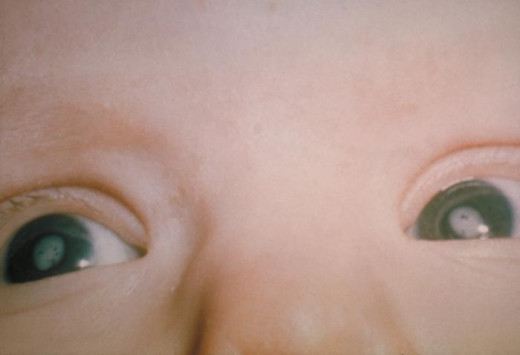
Cataract Surgery
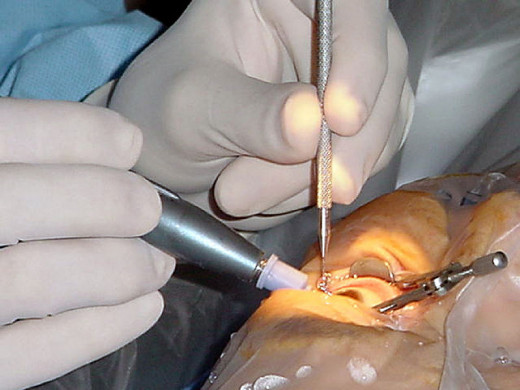
Surgery Day: What to Expect
What to Expect the Day of Your Cataract Surgery
The morning of my cataract surgery, I was asked to wash my face, hair, and around my eyes with a good anti-bacterial soap, and of course the rest of my body also. You will not be able to drive after having cataract surgery for at least one day, so you will need to be prepared to have someone drive you to the hospital for your appointment. There of course, you will be asked to disrobe and put on one of those backwards hospital gowns that ties in the back, and then another one which ties in the front.
After I got my hospital garb on, I was asked to sit in a chair where they took a couple of blood samples, and then they started an IV with some sedative to start getting me relaxed before the surgery. When they were ready for me, I walked into the operating room (along with my IV), and was asked to lay down on the operating table. I was having my right eye operated on, so my eye surgeon (I thought his name was Dr. Newsite, ironic aye?), was on my right, and the OR nurses were to my left. One of the nurses told me then that they were going to start adding some "happy juice" to my IV, and they asked me how I felt a few seconds after that. The next thing I remember, was feeling the surgeion washing my eye, and I said to him, "I'm not asleep yet!!!" I thought they were starting the surgery before the anesthesia took effect, but the surgeon said "We're finishing up now, and you're starting to wake up."
After they were all done, they wheeled me into the recovery room where I had to wait about a half an hour before they would allow me to get up. Afterwards, the surgeon gave me post-operative instructions, set up an appointment in his office for the next day, and gave me an excused absence from work for two weeks because he didn't want me working near any chemicals after my surgery.
Cataract Surgery: Important Facts
The Facts About Cataract Surgery
- Most of the time cataract surgery can be performed on an out-patient basis.
- The most difficult part of cataract surgery (most of the time) is the pre-op and post-op antibiotic regimen.
- The majority of cataract surgeries result in an improvement in eyesight.
- Cataract surgery, like any other type of surgery, has some risks.
- Every individual needs to weigh the risks vs. the potential benefits for themselves with input from their eye surgeon.
- For most people, cataract surgery will be painless.
Post Operative Care After Cataract Surgery
Post Operative Care After Cataract Surgery
Post operative care will not nessarily be the same for every patient. However, other than the antiobiotic regimen that each particular eye surgeon prefers, I suspect that they are all somewhat similar.
You will be instructed to leave your eye patch on overnight for a week after surgery probably. The day after your surgery, you will have a follow up doctor appointment.You will not be able to drive yet, so make sure you have a designated driver for this appointment. I don't know what kind of antibiotic they put in my eye after surgery, but it had the consistency of Vaseline petroleum jelly, and it took awhile for them to clean it out of my eye, after which they flushed my eyes with copious amount of eye wash solution. Then they put drops in my eyes to dilate my pupils and gave me another post-op eye exam and again tested the pressures in my eyes.
I was delighted to learn that my vision had improved significantly. Not enough to stop wearing glasses totally, but enough that I would pretty much only need them for close up reading and driving. After the exam, the surgeon presented me with a heavy pair of black plastic old fuddy-duddy glasses, and told me that I should wear them whenever I am outside or driving for the near future. I was also given instructions for the post-op antiobiotic regimen.
The post-op antiobiotic regimen was such that it would progresively wean me off of the antibiotics. The first week was three different kinds of eye drops three times each day. The second week was three different kinds of eye drops twice each day, and the third week down to the three kinds of eye drops only once each day. After the eye drops were finished, then it was time for another follow-up appointment, at which I received my new perscription for eyeglasses.
My next follow-up was scheduled for six months. At my final follow-up appointment, they did all the normal stuff, ie another eye exam, test the eye pressures, etc. They told me at this appointment that the membrane in which my new lens was encased had started to cloud up a little bit, which they said was normal after cataract surgery. The surgeon then invited me over to his desktop laser, where he proceded to drill 70 holes with the laser, into the membrane in order to clear up my vision again. After that my vision seemed to get back to normal.
Now, it is nearing time for me to get cataract surgery done on my other eye, as my vision has been progressively deteriorating. It is not yet as bad as my right eye was, but I can tell that it is getting worse, and the last visit to the eye doctor, they told me that I could no longer legally drive without glasses. (BUMMER!!!)
Cataract Surgery: Don't Be a Chicken
If You Need Cataract Surgery: Don't Be Afraid
If you are one of the many people who has cataracts and who could potentially benefit from cataract surgery, I highly recommend that you consult with eye doctor. Even though I was a bit nervous at first, I'm very glad that I took the jump and had cataract surgery performed on the eye that was bad initially. Now it is coming near the time for me to have this operation done on my other eye, and I will do it without hesitation as long as I maintain my health otherwise. I would highly recommend that anyone who might benefit from this surgery, take it from me, that even though there are no guarantees that any individual surgery will be successful, I would have rather risked the surgery than risked a life of not being able to read, use the computer, drive, and eventually probably not be able to work.
Resources Consulted While Researching This Article
- Glaucoma - MayoClinic.com
Glaucoma — Comprehensive overview covers symptoms, causes, treatment of this eye condition that threatens vision. - Pink eye (conjunctivitis) - MayoClinic.com
Pink eye (conjunctivitis) — Comprehensive overview covers symptoms, treatment and self-care of this contagious condition. - Are There Different Types of Cataracts? - American Foundation for the Blind
- Amiclear: Could it be a Game-Changer for Managing Di...
Are you tired of constantly monitoring your blood sugar levels and struggling to maintain a healthy lifestyle with diabetes? Look no further – Amiclear diabetes treatment might be the solution you've been searching for.I’m - America's Number One Terroristic Threat
The number one terroristic threat to America isn't Al-Queda, Iran's Nuclear Program, nor North Korea. The number one terroristic threat to America is obesity, particularly among our young children.
Affiliate Disclosure:
This website may contain affiliate links, which means we may earn a commission if you make a purchase through these links. We only recommend products or services that we believe will add value to our readers. The commissions earned through these links help support the content we create and the maintenance of this website.
Please note that this does not affect the price you pay for any products or services purchased through these affiliate links. Your support is greatly appreciated, and we strive to provide honest and unbiased information to assist you in making informed decisions.
Thank you for your support!
This content reflects the personal opinions of the author. It is accurate and true to the best of the author’s knowledge and should not be substituted for impartial fact or advice in legal, political, or personal matters.
© 2013 John Fisher


